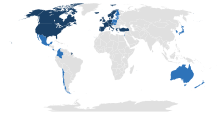Australia has mixed OECD rankings for literacy and numeracy amongst adults
Friday, October 11, 2013

Image: Canuckguy and Emuzesto.
On Tuesday the Organisation for Economic Co-operation and Development (OECD), a 34 member international economic organization founded in 1961 that traces its origins back to the World War II-era Marshall Plan, published results on the state of adult skills in 24 countries, most of them European. Australia had mixed rankings for literacy and numeracy amongst adults, finishing amongst the top for literacy and in the middle for numeracy.
Internationally, Australia ranks fourth amongst surveyed countries for literacy proficiency amongst adults. At the highest proficiency level, level 5, Australia ranks as the second highest percentage of surveyed nations at 1.3%. It is tied with the Netherlands. Only Finland is higher at 2.2%. Readers at this level synthesize text, compare and contrasts ideas and points of view, and process information across multiple sources. Australia, at 9.4%, has one of the smallest percentages of their population at reading proficiency level 1. This means adults have a basic understanding of what they read, can fill out forms and can understanding the meaning of sentences. Overall, Australia's mean reading proficiency score puts them on par with Norway and Sweden. When scores are adjusted for non-response, Australia is on par with Estonia. Amongst young adults aged 16 to 24 years, Australia ranks seventh amongst surveyed countries, with a mean score comparable to the Czech Republic, Estonia, Germany, Poland, Sweden, and the Flanders region of Belgium.
The Australian data said adult literacy skills did not strongly impact on social inequality, and literacy is not a barrier to social mobility. This contrasts to some other countries like the United States where literacy skills correlate to social mobility. Further, it shows an adult's socio-economic background is not tied very strongly to skills proficiency.
Australia ranks thirteenth amongst all surveyed countries in numeracy proficiency amongst adults aged 16 to 65 years. The country's mean score is comparable to Canada. Australia's relative high international performance in literacy and low performance in numeracy buck international trends. When only 16 to 24 year-olds are looked at, Australia's numeracy ranking falls one position and puts their performance comparable to Canada, Denmark, Norway, Poland, and Cyprus.
Individual performance on numeracy and literacy correlates highlighly in Australia at 0.889.
In proficiency at problem solving, Australia finishes sixth amongst surveyed nations. Adults were allowed to opt out of using computers for this test, and Australia had the sixth largest percentage at 13.7% opting to do so. In a technology-rich problem solving environment, Australia finished two nations below the international average, just behind Austria.
The percentage of adults who have completed university in Australia is close to the global average. Australia is slightly higher on the global average in terms of the percentage of the population who have not finished high school for people aged 25 to 34, and significantly higher for people aged 55 to 65 years.
Australia's percentage of foreign-born residents rose from around 23% in 1995 to about 27% in 2009. Australia, more than most surveyed nations, has employers who require reading skills at work.
The survey says e-commerce grew by more than a factor of eight by 2008 from the levels that existed in 2001. By 2010, over 60% of Australians had access to the Internet.
The report suggests the relatively similar scores amongst the different age groups is a result of standardized testing in Australia having changed little since the 1970s.
The results are based on a survey of 166,000 adults from Australia, Austria, Flanders, Canada, the Czech Republic, Denmark, Estonia, Finland, France, Germany, Ireland, Italy, Japan, South Korea, the Netherlands, Norway, Poland, Slovakia, Spain, Sweden, England, Northern Ireland, the United States, Cyprus, and Russia. They survey was conducted from August 2011 to March 2012, with the exceptions of Canada where data was collected from November 2011 to June 2012, and France from September to November 2012.
Sources
- "OECD Skills Outlook 2013, First results from the survey of adult skills" — Organisation for Economic Co-operation and Development, October 8, 2013
- "History of the OECD" — Organisation for Economic Co-operation and Development, October 8, 2013 (date of access)




